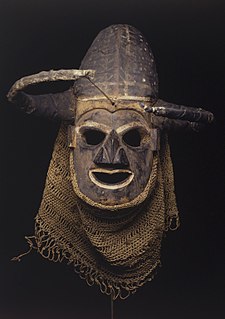
Congo may refer to either of two countries that border the Congo River in central Africa:

The Kongo people are a Bantu ethnic group primarily defined as the speakers of Kikongo.
At the Battle of Mbwila on October 29, 1665, Portuguese forces defeated the forces of the Kingdom of Kongo and decapitated king António I of Kongo, also called Nvita a Nkanga.

The Yaka are an African ethnic group found in southwestern Democratic Republic of the Congo, with Angola border to their west. They number about 300,000 and are related to the Suku people. They live in the forest and savanna region between the Kwango River and the Wamba River. Yaka is also the surname that is used in South Africa and Swaziland, including its clan-name called Dlunge.
Kwilu, also known as the House of Kwilu, was a kanda or royal lineage of the Kingdom of Kongo.
The Bemba belong to a large group of Bantu peoples mainly in the Northern, Luapula and Copperbelt Provinces of Zambia who trace their origins to the Luba and Lunda states of the upper Congo basin, in what became Katanga Province in southern Congo-Kinshasa (DRC). They are one of the larger ethnic group in Zambia. (A few other tribes in the Northern, Luapula and Copperbelt provinces of Zambia speak languages that are similar to Bemba but are not the same. Bemba history is a major historical phenomenon in the development of chieftainship in a large and culturally homogeneous region of central Africa.
John K. Thornton is an American historian specializing in the history of Africa, the African Diaspora and the Atlantic world. He is a professor in the history department at Boston University.
Mvemba a Nzinga or Nzinga Mbemba, also known as King Afonso I, was a ruler of the Kingdom of Kongo in the first half of the 16th century. He reigned over the Kongo Empire from 1509 to late 1542 or 1543.
Lukeni lua Nimi was the first king and founder of the Kingdom of Kongo Dia Ntotila. The name Nimi a Lukeni appeared in later oral traditions and some modern historians, notably Jean Cuvelier, popularized it. He conquered the kingdom of Mwene.

João I of Kongo, alias Nzinga a Nkuwu or Nkuwu Nzinga, was ruler of the Kingdom of Kongo between 1470 and 1509. He was baptized as João on 3 May 1491 by Portuguese missionaries. Due to his interest in Portugal and its culture, he initiated a major cultural initiative in 1485 upon the arrival of Diogo Cão. It was under these conditions that the first Atlantic Creole emerged, forming in both Central Africa and in Portugal.
Pedro II Nkanga a Mvika was a ruler of the kingdom of Kongo during the kingdom's first conflict with the Portuguese colony of Angola. He was the founder of the royal House of Nsundi and could trace his descent to one of Afonso I's daughters.
The precolonial history of Angola lasted until Portugal annexed the territory as a colony in 1655.
The Kinkanga, usually known as the Kinkanga a Mvika or House of Nsundi, was a royal kanda formed by King Pedro II, which ruled the Kingdom of Kongo from 1622 to 1631. While King Pedro II and his son Garcia I were the only other member of the faction or kanda to rule, it retained powerful members in provincial offices in the 1650s until its destruction in the 1670s. Despite this loss in prominence, they were remembered in tradition and are evoked in a proverb, still current in the 1920s Nkutama a mvila za makanda "Kinlaza, Kimpanzu ye Kinlaza makukwa matatu malambila Kongo"
The Kilukeni were members of the Lukeni kanda or House of Kilukeni, the ruling dynasty of the Kingdom of Kongo from its inception in the late 14th century until the 1567 with the rise of the House of Kwilu. The Kilukeni were springboard for most of the major factions that battled for control of Kongo during its civil war.

M'banza-Kongo, is the capital of Angola's northwestern Zaire Province. M'banza Kongo was founded some time before the arrival of the Portuguese in 1483 and was the capital of the Kilukeni dynasty ruling at that time. The site was temporarily abandoned during civil wars in the 17th century. It lies close to Angola's border with the Democratic Republic of the Congo. It is located at around 6°16′0″S14°15′0″E and sits on top of an impressive flat-topped mountain, sometimes called Mongo a Kaila because recent legends recall that the king created the clans of the kingdom and sent them out from there. In the valley to the south runs the Luezi River. In 2017, Mbanza Kongo was declared as a UNESCO World Heritage Site.
The Battle of Mbumbi was a military engagement between forces of Portuguese Angola and the Kingdom of Kongo.
The Battle of Mbandi Kasi was a military engagement between forces of Portuguese Angola and the Kingdom of Kongo during their first armed conflict which spanned from 1622 to 1623. The battle, while not widely reported by the Portuguese, was recorded in correspondence between the Kongolese and their Dutch allies. The battle marked the turn of the short war in the favor of Kongo and led to the ouster of the Portuguese governor of Luanda and the return of Kongolese subjects taken as slaves in earlier campaigns.





